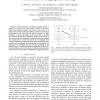Free Online Productivity Tools
i2Speak
i2Symbol
i2OCR
iTex2Img
iWeb2Print
iWeb2Shot
i2Type
iPdf2Split
iPdf2Merge
i2Bopomofo
i2Arabic
i2Style
i2Image
i2PDF
iLatex2Rtf
Sci2ools
124
click to vote
IROS
2007
IEEE
2007
IEEE
Control-driven mapping and planning
— Layered hybrid controllers typically include a planner at the top level with reactive control at the lower levels. The planner considers the state of the robot in a global context. The low-level controllers consider only the local environment of the robot and are able to operate at a high frequency to ensure the safety of the robot. Also, it is often the case that the low-level controllers consider more aspects of the robot’s state (e.g. kinematic constraints) than the planner. The consideration of such constraints at the planning level would prohibitively increase the state space the planner must consider and, accordingly, its running time and complexity. In this paper, we investigate how we can take advantage at the planning level of domain knowledge encapsulated in the lower level controllers, and we introduce a feedback mechanism that enables low-level controllers to influence the high-level planner.
IROS 2007 | Low-level Controllers | Lower Level | Planner | Robotics |
Related Content
| Added | 03 Jun 2010 |
| Updated | 03 Jun 2010 |
| Type | Conference |
| Year | 2007 |
| Where | IROS |
| Authors | David Wooden, Matthew Powers, Douglas C. MacKenzie, Tucker R. Balch, Magnus Egerstedt |
Comments (0)

